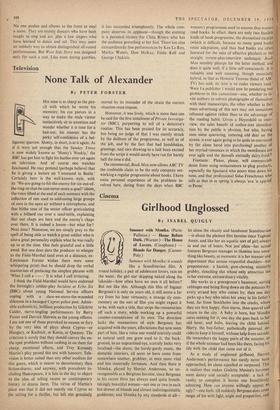Television
None Talk of Alexander
By PETER FORSTER His nose is as sharp as the pen- cil with which he wrote his memoirs; his eye pierces in a way to make the male viewer instinctively sit to attention and wonder whether it is time for a hair-cut; his manner has the perky self-confidence of a bel- ligerent sparrow. Monty, in short, is at it again. As if it were not enough that the Sunday Times is now Widely known as Nonty's Weekly,' the BBC has got him to fight his battles over yet again on television. And of course one watches fascinated. He may pretend (perhaps believe) that he is giving a lecture on `Command in Battle.' Certainly here is the well-known style, with its We-are-going-to-hit-the-enemy-for-six-out-of- the-ring-s0-that-he-can-never-score-a-goal!' idiom, the voice lifted at the end of each sentence with the inflection of one used to addressing large groups of men in the open air without a microphone, and that blithe tone of the senior officer gesticulating with a billiard cue Over a sand-table, explaining that our chaps are here and the enemy's chaps over there. It is indeed a lesson—but what for? Next time? Nonsense, we are simply prey to the spell of being able to watch a great soldier who is also a great personality explain what he was really up to at the time. One feels grateful and a little awed. But one does dare the producer to whisper to the Field-Marshal (and even at a distance, ex- Lieutenant Forster wishes there were some whispering print) that he should drop the verbal mannerism of prefacing the simplest phrases with 'What I call a —.' It is what I call irritating.
I think the Field-Marshal would have endorsed the fortnight's soldier-play Incident at Echo Six (BBC) about young National Service officers coping with a dare-we-move-the-wounded dilemma in a besieged Cyprus police post. Admir- able authenticity, brilliant production by Gilchrist Calder, nerve-tingling performances by Barry Foster and Derrick Sherwin as the young officers. I am not one of those provoked to nausea or fury by the very idea of plays about Cyprus—or Hungary, or Kashmir, or Korea, or Quemoy. The criterion is surely that they should convey the on- the-spot problems without cashing in on them for cheap, emotional effects, and Troy Kennedy Martin's play passed this test with honours. Tele- vision is better suited than any other medium for this genre, which is nearer to documentary than fiction-drama; and anyway, with precedents in- cluding Shakespeare, it is late in the day to object to the idea a telling recent or contemporary history in drama form. The virtue of Martin's piece was that it did not merely use Cyprus as Ole setting for a thriller, but left one genuinely moved by its reminder of the strain the current situation must impose.
Moreover, it was lively, which is more than can be said for the first instalment of Private Investiga- tor (BBC), purporting to tell of a detective's routine. This has been praised for its accuracy, but being no judge of that I was merely struck by the dullness of the programme, as well as of the job, and by the fact that had handshakes, greetings, and cars drawing to a halt been excised from the script it would surely have run for barely half the time it did.
On commercial, Book Man now allows ABC TV the creditable claim to be the only company net- working a regular programme about books. I have some personal experience of the problems in- volved here, dating from the days when BBC women's programmes used to assume that women read books. In effect, there are only two feasible kinds of book programme, the dramatised excerpt' (which is difficult, because so many good books: resist adaptation, and thus bad books are often featured for the sake of effective playlets) or the straight review-plus-interview technique. Book Man sensibly plumps for the latter method, and does it quite well, if a little self-consciously. It Is valuable and well meaning, though essentially', hybrid, in that as Howard Thomas (head of ABC, TV) has said, its 'aim is to make viewers read.' Were I a publisher I would now be pondering two problems in this connection—one, whether to in- vite authors to submit photographs of themselves with their manuscripts, the other whether in fact mass advertising of this sort may not sometimes, rebound against rather than to the advantage of the reading habit. Given a Heyerdahl to inter- view, the sales benefit of author-text identifica- tion by the public is obvious, but who, having seen some quavering, tottering old dear on the screen, is ever again going to be quite so convinced by (let alone lured into purchasing) another of her myriad romances in which the swordsmen are ever agile and the damsels eternally dairy-fresh?
Footnote : Please, please, will commercials, desist from using restaurateurs to plug products, especially the Spaniard who pours wine down his nose, and that professional Soho Frenchman w1!0_ tells us that in ze spring 'e always 'ave 'is aperitif, in Paree:

























 Previous page
Previous page